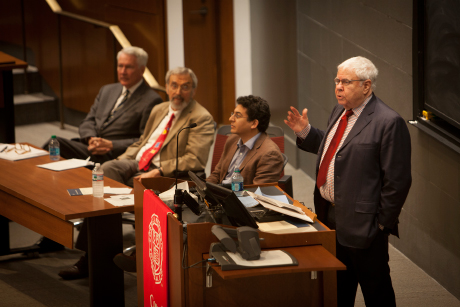Constitutional scholar looks at who can and cannot vote
By Natalie O'Toole

Less than two weeks ago, a vote for Scottish independence took place to overturn the Treaty of Union that formed the United Kingdom of Great Britain 307 years ago. However, citizens of Great Britain living outside Scotland were not permitted to vote on the referendum.
“You might think that undoing the treaty… [would] be of interest to the people from the rest of what we call Great Britain. But they had no say in this. They didn’t count,” said Sanford Levinson, professor of government at the University of Texas Law School in his speech, “‘Who Counts?’ ‘Sez Who?’” at Cornell Sept. 29.
Discussing the recent Scottish independence vote, Levinson said he does not believe there is a true answer to the question of “who counts” in the issue of government representation and highlighted some details he believes are fundamental to this question. For instance, he said Scots living outside the country were not allowed to vote: “To be Scottish is not only to drink scotch, but to what? To wear a kilt and have some deep feeling of Scottish identity? That’s not a silly argument, but then you might wonder why Scots living outside of Scotland couldn’t vote. Also, it makes it at least interesting that Portugese nationals living in Scotland could vote. So residency in Scotland is what qualified you to vote on whether Great Britain should continue.”
Additionally, Levinson said that the first minister of Scotland pushed for 16- and 17-year-olds to be able to vote on this issue, even though they are not allowed to vote on anything else: “[He] thought that youngsters would be more likely to be appealed to by the myth and symbols of Scottish nationalism.”
Shifting the argument to the United States, Levinson discussed how our founding fathers were rather exclusionary for proclaiming their government was run by “We the People.” He said although women were at least “members of the political community,” they lacked political representation along with Native Americans and African-Americans.
“I certainly would take an oath that many, many slaves or former slaves supported the British during the American Revolution with very good reason, as did many American Indian tribes, also for very good reason, because they could look at the so-called patriots and realize quite quickly that there was really nothing in it for them,” said Levinson.
Finally, he talked about how U.S. politicians are continuing to heavily influence representation in modern times through gerrymandering and other policies. For example, Texas is allowed three additional representatives because of their large number of illegal aliens even though “it is extraordinarily difficult … to regard them as represented in any way. Ditto with regard to prisoners.”
Levinson continued, saying, “Everybody is gaming the system when deciding who can vote and who [cannot], what sorts of identification you have to show or not, [and] whether college students should be allowed to register in the community where they’re attending college rather than being told ‘you don’t count here, you have to vote back home.’”
“We also have to pay attention to the institutions, the organizations or in some cases, individuals, who claim that they have some privileged insight into determining who really and truly counts,” he concluded.
The lecture event was co-sponsored by the Andrew E. Mellon Foundation, the Robert S. Stevens Lecture Fund from the Cornell Law School and the Cornell Society for the Humanities.
Natalie O’Toole ’16 is a writer intern for the Cornell Chronicle.
Media Contact
Get Cornell news delivered right to your inbox.
Subscribe